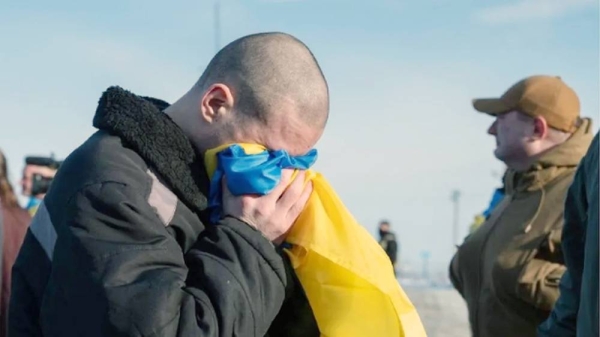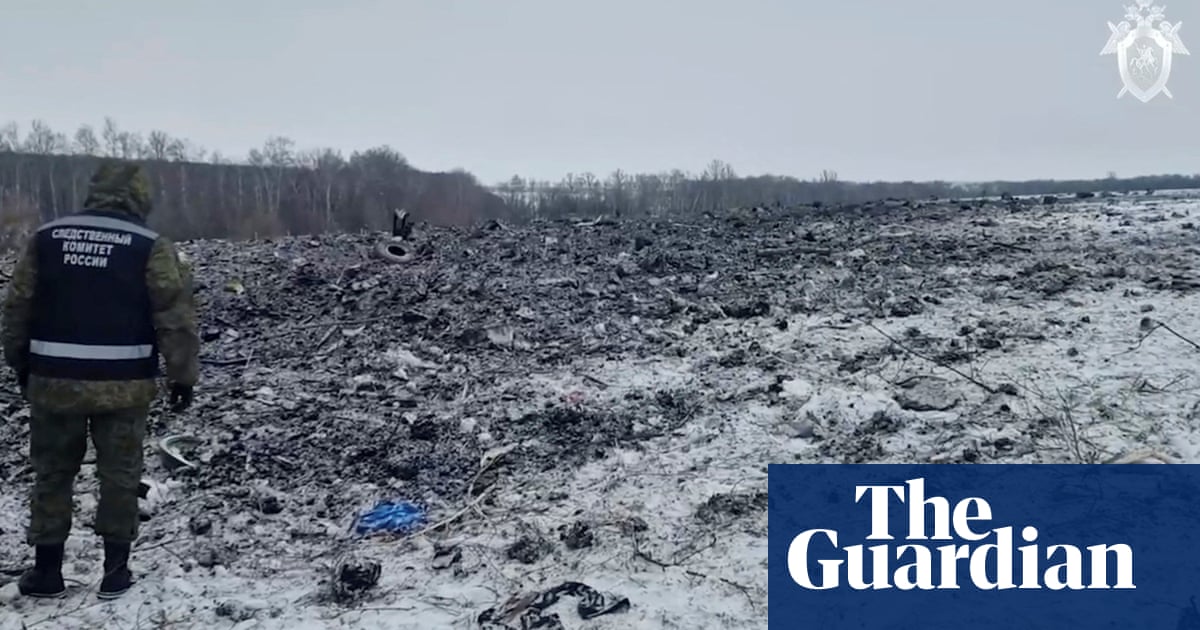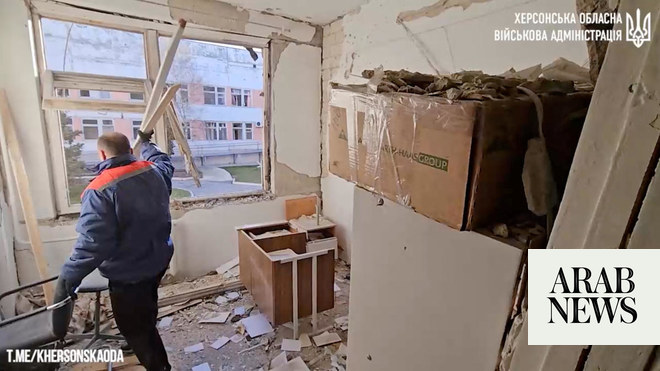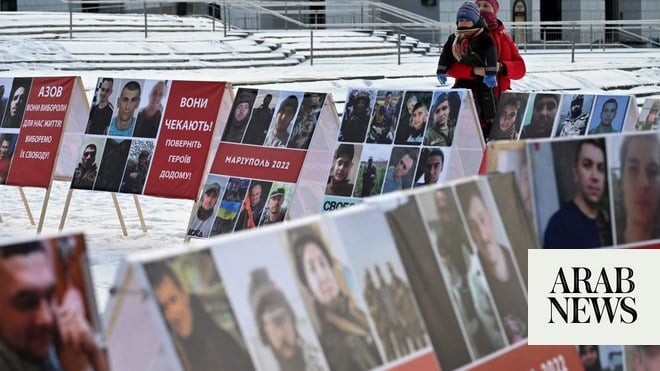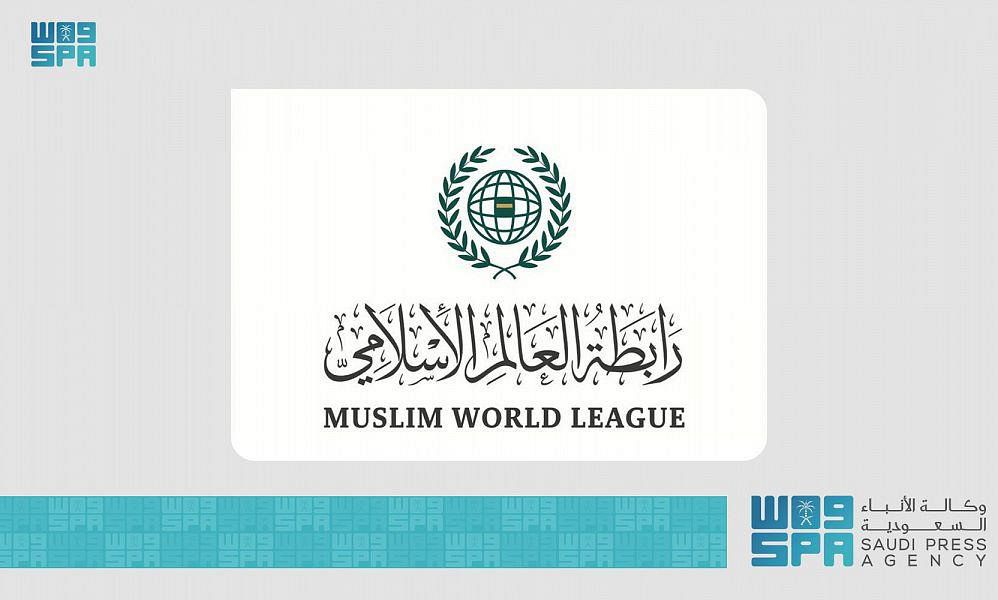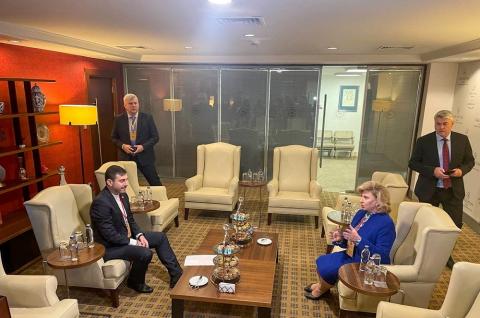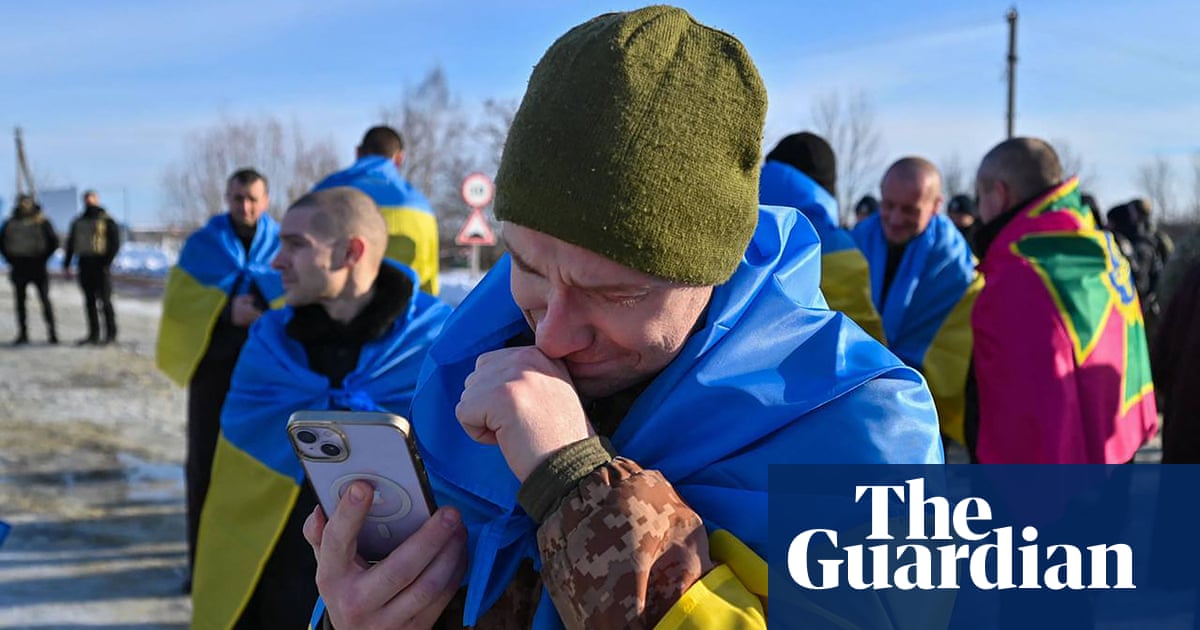
Russia and Ukraine have conducted a major prisoner-of-war exchange a week after a previous swap was prevented when a Russian Il-76 transport plane was shot down and exploded near the border between the two countries.
Both sides said about 200 prisoners each had been exchanged on Wednesday, although they disagreed about the exact figures.
“Our people are back, 207 of them,” Ukraine’s president, Volodymyr Zelenskiy, wrote. “We return them home no matter what.”
He published photos showing Ukrainian soldiers hugging, making telephone calls and crying after the swap. Many were holding yellow-and-blue Ukrainian flags.
Russia’s defence ministry released a statement in which it confirmed the swap and said “exactly 195 Ukrainian armed forces prisoners of war have been handed over” for the return of 195 captured Russian soldiers.
Wednesday’s swap marked an unexpectedly quick return to prisoner exchanges after Russia accused Ukraine of shooting down the transport plane last week shortly before a similar swap was to have taken place.
Russia said there had been 65 Ukrainian PoWs on board and accused Ukraine of intentionally targeting the flight, but it has not released proof that there were Ukrainians onboard, or a confirmed flight manifest.
Ukraine said it had no information about prisoners onboard the plane but confirmed plans for a swap and accused Russia of putting its service personnel at risk. Both sides have ordered an investigation into the crash.
“It is clear that the Russians are playing with the lives of Ukrainian prisoners, the feelings of their loved ones and the emotions of our society,” Zelenskiy said last week.
In remarks on Wednesday, Russia’s president, Vladimir Putin, repeated claims that the Il-76 had been downed by a western-supplied Patriot surface-to-air missile and that Ukrainian PoWs were onboard, without providing evidence.
At the same time, he said that Russia would continue to conduct prisoner exchanges with Ukraine. “Will this stop exchanges or not?” he said at a meeting of political supporters. “We won’t stop exchanges: we need to collect our guys.”
Prisoner exchanges are a sensitive topic in both countries, where families of the captives have demanded that the government do more to bring their loved ones home. In his remarks, Zelenskiy underlined Ukraine’s efforts to return captive soldiers, saying that the government had held 50 PoW exchanges and returned 3,035 captives from Russia.
Nearly half of the Ukrainians returned on Wednesday had defended the besieged city of Mariupol in 2022, Zelenskiy said. There were 27 officers among the returnees, along with members of the Ukrainian national guard, border guard and national police.
“We remember each Ukrainian in captivity, both warriors and civilians,” Zelenskiy said. “We must bring all of them back. We are working on it … We will make every effort to return each and every one. We have not forgotten about anyone.”
The latest swap comes amid reports in Kyiv that Zelenskiy is considering a major shake-up of the military, including a plan to replace the popular senior military commander Valerii Zaluzhnyi.
Putin, during his remarks, said that Russia would continue to take land in Ukraine in order to create a “demilitarised” buffer zone to protect Russia from long-range western weapons.
“This line should be at such a distance from our territory as to ensure security,” Putin said. “I mean long-range weapons, primarily western-made ones.” He added that Russia would focus on pushing Ukraine back from cities and territories that it had annexed last year.
“We will keep doing that,” he said. “And this is the main motive for our guys who are fighting and risking their lives to defend our home country and our people.”
Putin also said that Russia’s calls for an international investigation into last week’s crash were being ignored, at the same time as a series of new rulings were delivered by the International Court of Justice (ICJ).
On Wednesday, the ICJ mostly rejected Ukraine’s case that Russia had been financing terrorism in eastern Ukraine before the full-scale invasion and did not order Moscow to pay compensation, as requested by Kyiv.
The legally binding final ruling by the UN’s top court came in a case filed by Ukraine in 2017, in which Kyiv accused Moscow of breaching conventions against discrimination and the financing of terrorism after Russia’s annexation of Crimea and the subsequent fighting in eastern Ukraine.
Ukraine wanted the ICJ to order Moscow to pay reparations for attacks and crimes in the country’s east, including the downing of Malaysia Airlines flight MH17 on 17 July2014, and the financing of pro-Russian separatist rebels in the east of the country.
But the court rejected most of Ukraine’s requests, ruling only that Russia had violated one article of the UN treaty by failing to take measures to investigate facts “regarding persons who have allegedly committed an offence”.
The court also declined to rule specifically on Russian responsibility for the shooting down of flight MH17, as Kyiv had asked it to do.
The ICJ also ruled that Russia had violated the UN anti-discrimination treaty by failing to protect non-Russian languages in schools in Crimea, but did not grant Ukraine the compensation it had demanded from Russia.
Ukraine has accused Russia of adopting a policy of “Russification” after its annexation of the Crimean peninsula.
On Friday, the ICJ will rule on a separate case filed by Ukraine shortly after the invasion, alleging that Moscow launched its attack based on trumped-up genocide allegations. The court has already issued an interim order for Russia to halt its invasion, which Moscow has ignored.




